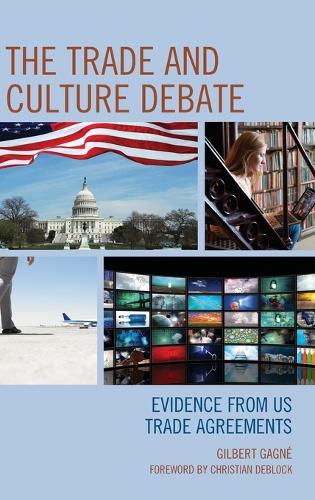
The Trade and Culture Debate: Evidence from US Trade Agreements
(Hardback)
Publishing Details
The Trade and Culture Debate: Evidence from US Trade Agreements
By (Author) Gilbert Gagne
Foreword by Christian Deblock
Bloomsbury Publishing PLC
Lexington Books
17th October 2016
United States
Classifications
Professional and Scholarly
Non Fiction
Central / national / federal government policies
382.0973
Physical Properties
Hardback
190
Width 159mm, Height 239mm, Spine 20mm
435g
Description
As the first exporter of cultural goods and services, the United States has long held that such products should be treated like any other merchandise and be liberalized. On the other hand, for countries such as France and Canada who are concerned about the impact of economic globalization and the digital revolution on their cultural identity, cultural products should be exempted from economic liberalization or subject to a cultural exception. These conflicting views and interests between states as to the treatment of cultural products in international economic law lie at the hearth of the trade and culture debate. These differences have led to serious tensions over the liberalization of cultural services within the World Trade Organization, as well as to a Convention within UNESCO to recognize the economic and cultural character of cultural products and the states right to pursue cultural policies. With most states still not keen on liberalizing the cultural sector and the stalemate in the Doha Round, the United States has turned to preferential trade agreements to secure its policy preferences on the treatment of cultural products. Since the beginning of the twenty-first century, the US government has concluded eleven trade agreements grouping sixteen countries and has been involved in three sets of plurilateral negotiations, with major implications for the evolution of the trade and culture debate.
Reviews
This eye-opening book documents how the United States is trying to suppress cultural diversity through its trade agreements. An essential read for anyone concerned with protecting local cultural expression in the face of Hollywood domination. -- Peter S. Grant, McCarthy Tetrault
Gagns analysis is empirically rich, current, and attentive to broader societal shifts, notably the prominence of digital and commercial services. Those interested in the trade and culture debates of the 1990s will welcome this careful and comprehensive update. Yet the close analysis of a range of key provisions in more than a dozen recent FTAs, including TiSA, TPP, and TTIP, should also have broader appeal. Gagn has performed a great service with this study. -- Patricia M. Goff, Wilfrid Laurier University
A first wave of studies on trade and culture in international law has focused on the World Trade Organization (WTO). Gilbert Gagns book belongs to a second wave, scrutinizing the parameters for the culture sector in the free trade agreements (FTAs), which the United States has concluded with different countries throughout the world. Highly recommended reading for anybody interested in the evolution of the trade and culture debate in a WTO-Plus era. -- Christoph B. Graber, University of Zurich
Free trade agreements (FTAs) are increasingly where the action is in the trading system, and Gilbert Gagn, in The Trade and Culture Debate: Evidence from US Trade Agreements, breaks down how the United States, the top exporter of entertainment media, has turned to FTAs to propel its trade agenda for the new digital environment. Through an exhaustive inventory of US FTAs, the book reveals that trade partners have conceded sweeping commitments to keep digital and electronic trade open and narrowed their policy space to manage traditional cultural industriesstrong evidence that the shift to a less hardline US strategy has produced results. Set against the wider trade-culture conflict, one of the oldest trade controversies, Gagn provides valuable new information for policy analysts, students of the global economy, and citizens interested in how cultural goods and services are handled in contemporary trade agreements. -- Kerry A. Chase, Brandeis University
Author Bio
Gilbert Gagn is professor of international relations at Bishops University.
